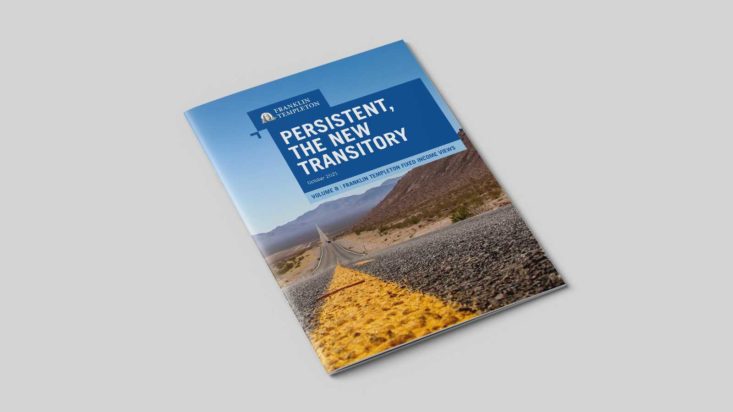Persistent, the New Transitory: Q4 Franklin Templeton Fixed Income Views
Supply-side driven inflationary pressures have gained increasing prominence during the course of the third quarter. The global economic recovery has remained overall on track, with robust growth in most world regions. In the United States, second quarter gross domestic product (GDP) growth missed expectations, but the economy still expanded at the fastest pace in 70 years and both real and nominal GDP exceeded the pre-COVID peaks (by one and five percentage points, respectively).1 The recovery continues to be driven by consumer spending, with the anticipated rotation from goods to services well underway, while business equipment investment has picked up in anticipation of stronger future consumer demand.
Household spending drove a healthy recovery in Europe as well, with consumers responding strongly to the gradual easing of activity restrictions. The euro area expanded by 2.2% quarter-over-quarter (Q/Q), with peripheral countries such as Italy and Spain outperforming core economies like France and Germany; Europe’s largest economy in particular disappointed, held back by supply constraints hitting the auto industry. The euro area’s economy remains some 3% below pre-COVID levels.2
The fast-spreading COVID Delta variant drove a sharp rise in new cases across several countries and US states, with increasing reports of “breakthrough” cases (which represent fully vaccinated individuals who have contracted the virus). This brought back concerns for the economic outlook. However, even in areas experiencing spikes in new cases, hospitalization and death rates remained largely stable or rose much less than infections. This confirms that vaccines remain very effective in preventing serious adverse health effects from COVID, reducing the risk of extreme pressure on health care systems. The share of fully vaccinated population has now reached 54% in the United States, over 62% in the European Union (EU), 65% in the United Kingdom, and over 70% in Canada.3 Vaccination rates tend to be even higher among the most vulnerable, notably the elderly.
Thanks to the protection offered by vaccines, authorities in both Europe and the United States have refrained from re-imposing severe limitations on social and economic activity; restrictions have mostly targeted large social events like concerts, reducing the adverse impact on the economy. The focus has shifted on requiring proof of vaccination (or a recent negative COVID test) for participating in a range of activities (such as indoor eating at restaurants or going to work) in order to further boost vaccine uptake. Restrictions have been more significant in some Asian countries where vaccination rates are lower, compounding the ongoing disruption of global supply chains. Overall, developments on the pandemic front could slow the global recovery somewhat but do not threaten to derail it, in our view.










